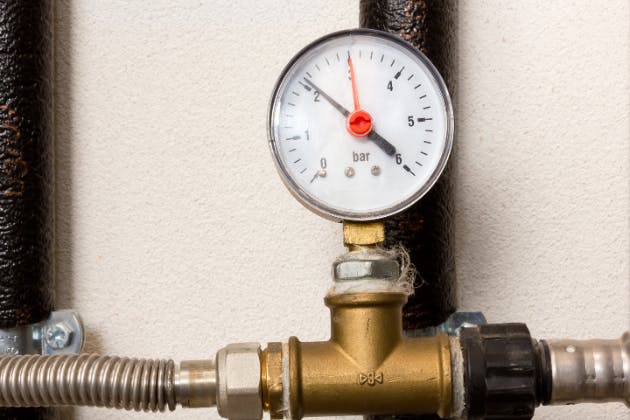Boiler pressure plays a vital role in keeping your heating system running smoothly. Low pressure can cause poor heating performance, and if left unchecked, may lead to system damage or breakdown. In this blog, we’ll explain what boiler pressure is, what causes it to drop, and what you can do about it, plus when it’s time to call in the experts.

What to Do When Your Boiler Pressure is Low
Your boiler’s pressure helps circulate hot water through your radiators and pipes. Ideally, the pressure should sit between 1 and 1.5 bar when cold. You can check this on the pressure gauge, usually found on the front or underside of your boiler. If the reading is below 1, your system may struggle to heat your home efficiently.
Common Causes of Low Boiler Pressure
1. Leaks in the System
Leaks are one of the most frequent causes of pressure loss. Check exposed pipework and joints for damp patches or corrosion. While leak sealant might help temporarily, it's not a long-term fix. Call a professional to carry out proper repairs.
2. Faulty Pressure Relief Valve
The pressure relief valve helps prevent your boiler from overpressurising. If it’s damaged or worn, it may discharge water unnecessarily, causing a pressure drop. Look for dripping water around the valve or signs of corrosion. Faulty valves should always be replaced by a professional.
3. Expansion Vessel Problems
The expansion vessel balances pressure inside the boiler. Over time, its internal diaphragm or Schrader valve may fail. This is a more complex issue and requires diagnosis and repair by a Gas Safe engineer.
4. Open Filling Loop
After topping up your boiler, ensure the filling loop (usually a braided hose with two valves) is fully closed. Leaving it even slightly open can cause ongoing pressure loss.
Repressurising Your Boiler: A Quick DIY Fix
If your pressure is slightly low, you may be able to repressurise your system. Follow these steps carefully:
- Turn off the boiler and allow it to cool.
- Locate the filling loop (silver hose with two valves).
- Open both valves slowly and let water enter the system.
- Watch the gauge and close the valves when pressure reaches 1.5 bar.
- Bleed radiators to remove trapped air.
- Recheck pressure and adjust if needed.
Avoid overfilling the system, too much pressure can cause new issues.
When to Call a Professional
Some boiler pressure problems require expert help. Contact a qualified plumber or heating engineer if:
- The pressure keeps dropping after multiple top-ups
- You find leaks you can’t reach or repair
- You suspect a faulty valve or expansion vessel
- You’re unsure what’s causing the issue
Professional servicing helps catch these problems early and ensures your boiler stays in top condition.
Preventing Boiler Pressure Problems
You can reduce the risk of boiler pressure issues with a few simple steps:
- Book annual servicing with a Gas Safe registered engineer
- Check visible pipework for leaks or corrosion
- Address minor issues before they escalate
- Insulate pipes to prevent freezing in winter
- Pay attention to strange noises or performance changes
Staying proactive helps avoid costly repairs and keeps your home comfortably heated all year round.
Need Help with Boiler Pressure in Hornchurch, Romford, or Dagenham?
RDS Plumbing Ltd offers reliable boiler repairs, servicing, and emergency support across Hornchurch, Romford, and Dagenham. If you're dealing with persistent pressure issues or want to book a boiler check, call us today on 08000282031 or 01708444685, or fill out our contact form to get started.

